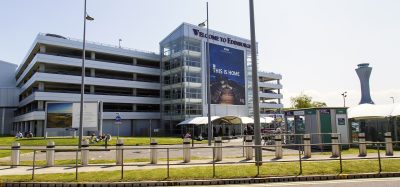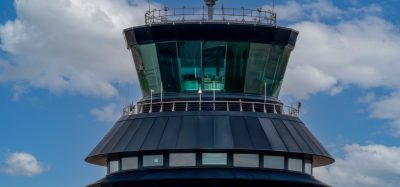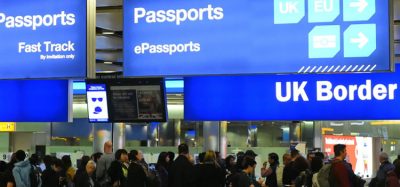Eastern and central Europe’s retail partnership
Posted: 1 August 2012 | Alan Bork, Commercial Director at Budapest Airport | No comments yet
It makes sense to bring together the central and eastern European travel retail and duty free industry under an umbrella association. Providing the members with a forum to exchange views, build relationships, and find common ground while establishing a united voice that can tackle local and regional issues as they arise. This initiative is already attracting support from key stakeholders who recognise the value it provides in helping to further develop the industry in the region and to guide it to reach its full potential.
Although the volume of the duty free and travel retail sector in the region may not be that significant compared to the rest of Europe, one should pay attention to the growth rates in the region. While Europe’s overall share of global duty free sales decreased from 50 per cent in 1998 to 35 per cent in 2010, the Eastern European share increased from 3.7 to 7.6 per cent in the same period.
That duty free and travel retail industry plays an important part in the airport sector is an increasingly clear position currently being recognised by all stakeholders including ACI. For most airports, as much as 40 per cent and even up to 60 per cent in some cases of total revenues are generated from non-aviation activity, where duty free and travel retail account for the biggest part.
It makes sense to bring together the central and eastern European travel retail and duty free industry under an umbrella association. Providing the members with a forum to exchange views, build relationships, and find common ground while establishing a united voice that can tackle local and regional issues as they arise. This initiative is already attracting support from key stakeholders who recognise the value it provides in helping to further develop the industry in the region and to guide it to reach its full potential.
Although the volume of the duty free and travel retail sector in the region may not be that significant compared to the rest of Europe, one should pay attention to the growth rates in the region. While Europe’s overall share of global duty free sales decreased from 50 per cent in 1998 to 35 per cent in 2010, the Eastern European share increased from 3.7 to 7.6 per cent in the same period.
That duty free and travel retail industry plays an important part in the airport sector is an increasingly clear position currently being recognised by all stakeholders including ACI. For most airports, as much as 40 per cent and even up to 60 per cent in some cases of total revenues are generated from non-aviation activity, where duty free and travel retail account for the biggest part. With the core airline activity increasingly under pressure, airports are forced to further develop the income from non-aviation activity. However, this can only be achieved with the pro-active involvement of all players within the industry itself.
National legislative initiatives far too often impact on the duty free and travel retail industry, presenting significant challenges. It is clear that legislators do not take into account the impact on the industry. One example of this is the recent tobacco retailing restrictions proposed by the Hungarian Government, which does not take into consideration that travel retail is a separate distribution channel not subject to the normal market conditions in the domestic retailing environment. This new regulation will, in effect, make tobacco sales impossible at Budapest Airport and we, as an industry, must stand together and make legislators aware of their mistakes.
It is vital that we raise the awareness and the priority level in the minds of legislators so they can understand the role of the industry and the benefits it provides, so when policy proposals come out they should think immediately of what impact it will have on duty free and travel retail. The Hungarian example tells us all too clear that this is not the case today. We must actively seek to identify and develop spokespeople and supporters who will look for ways to develop the industry further, who will seek to protect it from negative impact. We must also look to ourselves to mobilise the knowledge and ability that is already present within our industry.
We must identify how best to tap into that and involve it in activities that will help to drive innovation and growth and perhaps more importantly to identify challenges before they become real problems.
In order to do this, we need to develop an industry body to act as an umbrella association that can bring together key stakeholders from the various industries including suppliers, retailers and airports: a Central and Eastern European Travel Retail Association (CEETRA).
The inspiration for the structure of such an industry body was garnered from the Nordic Travel Retail Group, which was formed postabolition in 2000 from national associations in Norway, Denmark, Sweden, Finland and the Baltic countries. Today the NTRG is a very powerful industry association that is successfully and pro-actively representing and defending the duty free and travel retail industry in the whole of the Nordic region. The vision for the CEETRA is a similar position in the Central and Eastern European region.
With support from the European Travel Retail Council and the Tax Free World Association, we have convened a group of representatives of the industry who are to act as ‘founding fathers’ of the new association. Among these are Gebr. Heinemann and Aelia, two of the major players in the region and both in the top-five travel retail operators in the world. Great support also comes from some of the major suppliers to the duty free and travel retail industry. With regard to influencing local governments, the airports act as important infrastructure partners to governments, and are crucial. A number of airports in the region have already pledged their support.
In order for the industry to grow there is a combination of ingredients that are needed. The right mix can create a situation that stimulates growth and ensures that the right framework is in place to encourage and allow for a strong duty free and travel retail industry. This, in turn, provides strong revenues to airports benefiting the countries in which they are located.
Unlike Coca-Cola, there is no secret ingredient but a mix of vision, communication, representation and community.
All industry stakeholders want to see it thrive and develop, to reach its full potential. It is important that these stakeholders have a shared vision to rally around and to promote. The shared vision for the industry and what it can achieve drives the development and promotion of the duty free and travel retail sectors.
The vision required for the industry is of a thriving and strong duty free and travel retail sector in the region that is recognised as a world leader in practice and execution. An industry that drives airport revenue, creates employment and contributes to the local economy, an industry that is acknowledged for its unique nature and benefits. This is really the heart of the Central and Eastern European Travel Retail Association, the shared vision – it is from this that all other activities and initiatives spring.
The second element supports this, the communication of that vision. It is important that our shared vision is not kept a secret, as that will not help us achieve it. We must communicate our vision for the industry to the stakeholders.
We must show people the important role that the industry plays today and the benefits that it provides to airports, local economy and national infrastructure. We must also communicate the potential of the industry and what it is that can be achieved, by explaining to stakeholders the importance of supporting the development of a strong performing duty free and travel retail industry, and identifying strategies to achieve that.
Our communication must also reach out to industry stakeholders to understand their concerns and ideas for the future, so we can best represent them.
There must also be a strong representative voice that speaks for the entire industry in the region, and can engage with policy makers within the various member states. Due to the nature of duty free and travel retail, we are particularly susceptible to legislation impacting on our business. In many cases that is not even an intended consequence but merely that the legislators have not given consideration to how a proposal would impact on our business.
The industry will benefit significantly from a recognised representative body that can demonstrate strong industry membership and backing, and which can engage with legislators as needed, representing industry interests and promoting awareness of the duty free and travel retail industry.
Only through such strong regional rep resentation can we promote the shared vision of a strong industry, defend against legislative prop osals that would negatively impact the develop ment of the industry throughout the region and champion initiatives that strengthen and nurture the duty free and travel retail sector.
I believe the final element is one of the most important: community. There is great value in bringing together industry stakeholders to build relationships, share ideas and discuss issues. There is great talent and insight amongst the various companies involved in duty free and travel retail, people that are every day tackling issues that affect their business and coming up with new and innovative ways of doing business to help grow the industry.
Bringing these people together through an umbrella group such as the Central and Eastern European Travel Retail Association allows us to share those insights and develop a strong community within the region, a community with shared vision and representation that works together to see the industry achieve its full potential.
Prior to the first general assembly, scheduled for October 2012, we will now approach all companies directly or indirectly involved in the duty free and travel retail industry in the region, to gain support for the Central and Eastern European Travel Retail Association.
About the author
Coming from a retail background Alan Bork joined the airport retail environment in the early 1990s in connection with the privatisation of Copenhagen Airport where he was responsible for developing the retail concept of the airport. Alan was also heavily involved in the campaign against duty free abolition in the late 1990s and, as Chairman of the Danish duty free association, in 2000 he was instrumental in setting up the Nordic Travel Retail Group. For almost two decades Alan has been around the duty free and travel retail industry working with retail in airports throughout the world. Alan has been the Commercial Director of the fully privatised Budapest Airport for 18 months. From that position, centrally located in the Eastern European region, Alan is now heavily involved in the setting up of the Central and Eastern European Travel Retail Association.
The International Airport Summit is open for registration!
Date: 19 – 20 November 2025
Location: JW Marriott Hotel Berlin
At our flagship event of the year, we will dive into the future of airport operations, with expert-led sessions on passenger experience, innovative smart technologies, baggage handling, airside operations, data, security, and sustainability.
This is where global airport leaders come together to share insights, challenges, and real-world solutions.
Limited complimentary passes are available for eligible professionals – first come, first served!
Issue
Related topics
Related airports
Related organisations
Central and Eastern European Travel Retail Association CEETRA, European Travel Retail Council (ETRC)

















